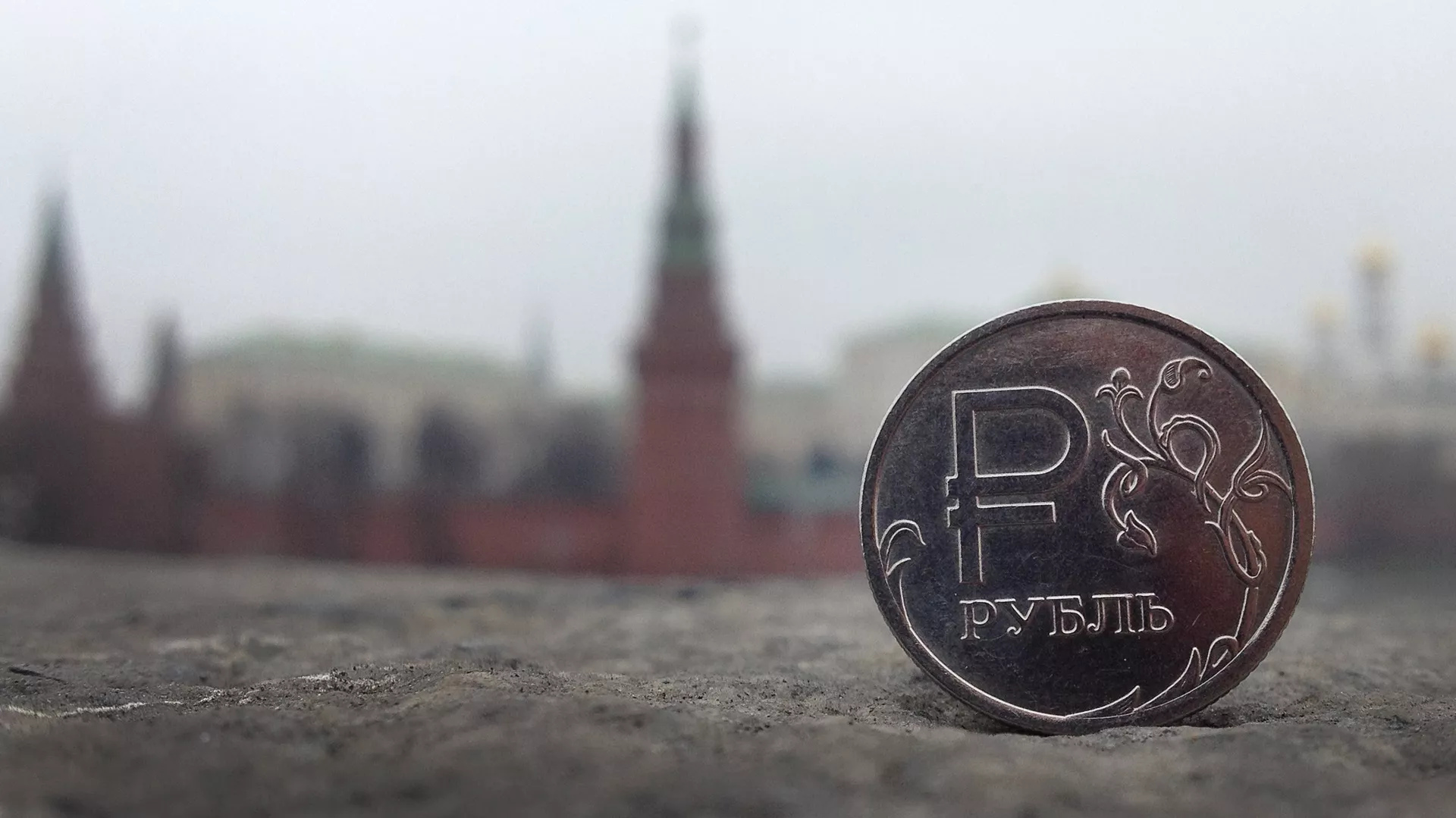https://sputnikglobe.com/20220418/russia-withstood-unprecedented-sanctions-pressure-from-west---putin-1094858060.html
Putin: Russia Has Withstood West's 'Economic Blitzkrieg' Attempt
Putin: Russia Has Withstood West's 'Economic Blitzkrieg' Attempt
Sputnik International
The US and its allies have slapped a grand total of over 9,600 sanctions against Russian officials, the state, companies, tycoons and other entities in... 18.04.2022, Sputnik International
2022-04-18T12:14+0000
2022-04-18T12:14+0000
2022-04-18T13:54+0000
russia
west
https://cdn1.img.sputnikglobe.com/img/104502/67/1045026706_159:0:2840:1508_1920x0_80_0_0_b7d0fd2ba91327cfc70000f74967a62f.jpg.webp
Russia has successfully withstood unprecedented sanctions pressure from the West, President Vladimir Putin has said."The calculation was to quickly undermine the financial and economic situation in our country, to provoke panic in the markets, the collapse of the banking system, and a large-scale shortage of goods in stores," Putin said, speaking at a briefing on the economic situation on Monday.Meanwhile, the president said, ordinary Europeans and Americans have been made to suffer a deterioration in their living standards as a result of their leaders' shortsightedness.Putin asked the government to continue to expand its programme of emergency measures to deal with Western pressure, including by accelerating the switchover to foreign trade in rubles and the currencies of Russia's trade partners.At the moment, the president said, the Russian economy has stabilised, and the ruble exchange rate has basically returned to the levels seen in early February, before Moscow and its Donbass allies kicked off their military operation in Ukraine.Russia achieved a Q1 2022 current account balance of payments of over $58 billion, "a historic maximum," Putin said.The Russian ruble collapsed in late February and early March against major foreign currencies, falling 30 percent against the US dollar and by a similar amount against the euro. The move prompted a temporary halt in trading on the Moscow stock exchange, led the central bank to raise the interest rate to 20 percent, and prompted authorities to force companies to sell 80 percent of their foreign exchange reserves to stabilise the situation.The ruble began to bounce back after Putin's announcement on 23 March ordering payments for Russian gas by designated 'unfriendly countries' (i.e. those which had introduced sanctions against Russia) to be made in rubles, and is currently trading at about 80.6 rubles/USD, approaching the 77.3 marker it hit before collapsing once Russia recognised the sovereignty of the Donbass republics in February. The Kremlin has since asked the relevant ministries to expand the list of goods to be traded for using national currencies over time.The Biden administration and European Union officials have not backed down on their sanctions-happy approach. Late last week, European Commission president Ursula von der Leyen told German media that Brussels' forthcoming sanctions against Russia would target large Russian banks and its oil industry. The White House has attempted to label rising gasoline prices and inflation "Putin's price hike," but has faced limited success as even Democratic strategists have warned that this talking point was failing to gain traction among ordinary Americans ahead of the November midterm elections. On Friday, Ukrainian authorities reportedly asked the US State Department to add Russia to its list of 'state sponsors of terror' in a move aimed at further turning up pressure on Russia's economy while threatening US partners with secondary restrictions if they continued to do business with Moscow.Countries outside the Western world have rejected cutting off economic and diplomatic ties with Russia amid the crisis over Ukraine, notwithstanding pressure to do so from the US and its allies. India, for example, has recently dramatically increased the purchase of discounted Russian oil. Other countries in Asia, Africa, and Latin America have expressed an interest in ramping up trade with Moscow, seeking to buy up energy and grains, while selling Russia a broad assortment of goods, including alternatives to advanced Western industrial manufactures, such as automobiles, electronics, and various machine goods.
https://sputnikglobe.com/20220417/poll-public-support-for-russian-sanctions-plummets-in-uk-as-cost-of-living-crisis-starts-to-bite-1094832075.html
https://sputnikglobe.com/20220417/inflation-could-reach-10-in-germany-deutsche-bank-deputy-ceo-warns-1094825320.html
west
Sputnik International
feedback@sputniknews.com
+74956456601
MIA „Rossiya Segodnya“
2022
News
en_EN
Sputnik International
feedback@sputniknews.com
+74956456601
MIA „Rossiya Segodnya“
Sputnik International
feedback@sputniknews.com
+74956456601
MIA „Rossiya Segodnya“
west
Putin: Russia Has Withstood West's 'Economic Blitzkrieg' Attempt
12:14 GMT 18.04.2022 (Updated: 13:54 GMT 18.04.2022) The US and its allies have slapped a grand total of over 9,600 sanctions against Russian officials, the state, companies, tycoons and other entities in connection with the crisis in Ukraine. Moscow now has more restrictions against it than Iran, Syria, North Korea, Venezuela and Myanmar combined.
Russia has successfully withstood unprecedented sanctions pressure from the West, President Vladimir Putin has said.
"The calculation was to quickly undermine the financial and economic situation in our country, to provoke panic in the markets, the collapse of the banking system, and a large-scale shortage of goods in stores," Putin said, speaking at a briefing on the economic situation on Monday.
"We can say with confidence that this policy against Russia has failed - that the strategy of the economic blitzkrieg has failed," he added.
Meanwhile, the president said, ordinary Europeans and Americans have been made to suffer a deterioration in their living standards as a result of their leaders' shortsightedness.
"Moreover, the sanctions were not without consequences for the initiators themselves. I am referring to the growth of inflation and unemployment, the deterioration of economic performance in the US and the countries of Europe, the decline in the standard of living of the Europeans and the devaluation of their savings," Putin said.
Putin asked the government to continue to expand its programme of emergency measures to deal with Western pressure, including by accelerating the switchover to foreign trade in rubles and the currencies of Russia's trade partners.
"The restrictions placed on Russia by unfriendly countries have undoubtedly affected the possibilities of our businesses. They have complicated the logistics of delivery in export and import, created obstacles for payment. It is necessary to assist entrepreneurs in solving these problems, including by speeding up the transition of foreign trade to settlements in rubles and the national currencies of countries which are reliable trade partners," he said.
At the moment, the president said, the Russian economy has stabilised, and the ruble exchange rate has basically returned to the levels seen in early February, before Moscow and its Donbass allies kicked off their military operation in Ukraine.
Russia achieved a Q1 2022 current account balance of payments of over $58 billion, "a historic maximum," Putin said.
The Russian ruble collapsed in late February and early March against major foreign currencies, falling 30 percent against the US dollar and by a similar amount against the euro. The move prompted a temporary halt in trading on the Moscow stock exchange, led the central bank to raise the interest rate to 20 percent, and prompted authorities to force companies to sell 80 percent of their foreign exchange reserves to stabilise the situation.
The ruble began to bounce back after Putin's
announcement on 23 March ordering payments for Russian gas by designated 'unfriendly countries' (i.e. those which had introduced sanctions against Russia) to be made in rubles, and is currently trading at about 80.6 rubles/USD, approaching the 77.3 marker it hit before collapsing once Russia recognised the sovereignty of the Donbass republics in February.
The Kremlin has since
asked the relevant ministries to expand the list of goods to be traded for using national currencies over time.
The Biden administration and European Union officials have not backed down on their sanctions-happy approach. Late last week, European Commission president Ursula von der Leyen
told German media that Brussels' forthcoming sanctions against Russia would target large Russian banks and its oil industry. The White House has attempted to label rising gasoline prices and inflation
"Putin's price hike," but has faced limited success as even Democratic strategists have warned that this talking point was
failing to gain traction among ordinary Americans ahead of the November midterm elections. On Friday, Ukrainian authorities
reportedly asked the US State Department to add Russia to its list of 'state sponsors of terror' in a move aimed at further turning up pressure on Russia's economy while threatening US partners with secondary restrictions if they continued to do business with Moscow.
Countries outside the Western world have rejected cutting off economic and diplomatic ties with Russia amid the crisis over Ukraine, notwithstanding pressure to do so from the US and its allies. India, for example, has recently dramatically increased the purchase of discounted Russian oil. Other countries in Asia, Africa, and Latin America have expressed an interest in ramping up trade with Moscow, seeking to buy up energy and grains, while selling Russia a broad assortment of goods, including alternatives to advanced Western industrial manufactures, such as automobiles, electronics, and various machine goods.






